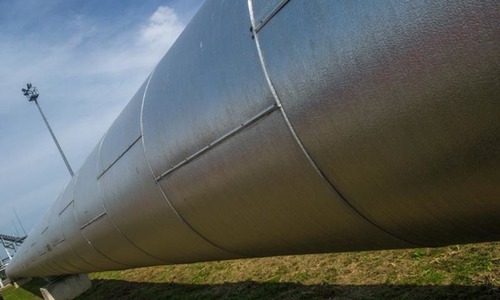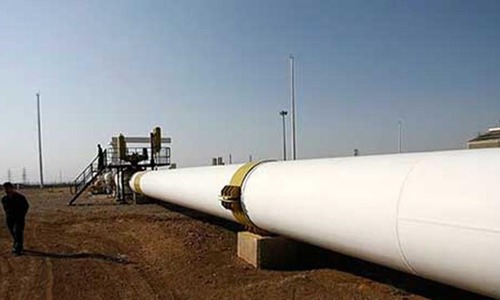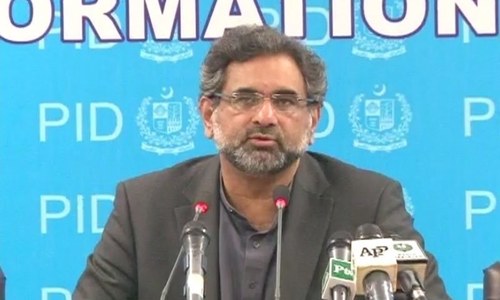HEFTY payloads of hydrocarbon resources have shifted from their 50-year-old base in Balochistan to Sindh over the last two decades and are now moving into the security-affected areas of Khyber Pakhtunkhwa and the adjoining tribal region.
In recent years, a majority of major oil and gas finds have been reported in this new field. But their development and commercialisation has been hampered, in part, by the security situation. However, the chief reason is the conflicting policies and the politics of Imran Khan’s PTI-led government in KP and the PML-N government in the centre.
While the federal government blames the PTI’s ‘dharna politics’ for a ‘massive setback to the national economy,’ professionals in KP are perturbed that the continuing acrimonious relationship between the centre and the province will have far-reaching consequences for the nation.
Dawn Business and Finance spoke to Mr Raziuddin, CEO of the Khyber Pakhtunkhwa Oil and Gas Company Limited (KPOGCL) — a firm set up as required under the 18th constitution amendment — for an overview of the ground situation.
‘Foreign energy majors like Kuwait’s Kufpec, Russia’s Rosgeo etc want to enter KP and Fata but the federal and provincial govts are not on the same page’
“The two governments [federal and provincial] are totally disconnected. They should move away from the ‘container legacy’ in the interest of development of hydropower and oil and gas resources to benefit the whole nation and eradicate the menace of terrorism and extremism in KP and Fata through job creation and industrialization,” he says.
In his assessment, three critical articles of the constitution — 154, 158 and 172(3) — related to centre-provincial relationships and responsibilities are being violated, trespassed or ignored.
“International energy majors like Kuwait’s Kufpec, Russia’s Rosgeo and others are entering KP and Fata but unfortunately the federal and provincial governments are not on the same page. Their acrimony is an irony for the country and the future generations,” says the CEO.
Raziuddin led the country’s largest exploration firm OGDCL and also Attock Refinery as managing director in the past and headed the energy group that formulated the energy-related section of the Planning Commission’s Vision 2025 and 11th five-year plan documents.
He says he recently gave a briefing at the Military Corps Headquarter in Peshawar on the situation, opportunities and the political infightings and the need for bringing the two political governments on the same page to deal with the challenges facing the economy, particularly natural resources.
“We want to fast-track and expedite oil and gas development in KP, but the federal ministries are cold-shouldering these efforts.”
Raziuddin claims the province is currently producing about 385m cubic feet of gas per day (MMCFD) and plans are in place to increase this to 2bn cubic feet per day by 2025 — half of the current national production of 4BCFD. “But it will be ironic if we are unable to ensure its consumption through increased industrialisation.”
The KP government had moved a summary to the Economic Coordination Committee (ECC) of the Cabinet in June 2014, seeking allocations for new gas finds of about 160MMCFD around Kohat and Karak for the setting up of an 800MW power plant near Khushal Garh.
But the federal government decided in November 2014 that the Private Power and Infrastructure Board (PPIB) — a federal agency — should set up the plant instead of the provincial government.
The KP government protested strongly but then gave in on the condition that the plant would be located in KP to feed special industrial zones in Hattar, Gadoon, Risalpur, Nowshera, Hayatabad and Sheikh Maltoon-Mardan.
“Today is the first anniversary of the ECC decision but the federal government is yet to issue tenders for the power plant. This is a provincial as well as a national loss from an economic and industrialisation point of view,” says Raziuddin. “We believe this is violation of Article 158 of the constitution. The federal government should at least set up the plant itself if it doesn’t want the province to do it.”
Article 158 promises the province having gas well-heads to have precedence on the natural resource over other parts of the country.
Inserted through the 18th amendment, Article 172(3) requires that minerals, oil and natural gas within a province or adjacent territorial waters be owned jointly and equally by that province and the federal government, without changing past commitments and obligations. The centre is not honouring this article.
The KPOGCL CEO says all existing operators are working in the hydrocarbon pay zones of 4,000 metres or less, but the urgent need is to go beyond 6,000 and even 12,000 metres deep where large deposits can be developed.
Here, the federal and provincial governments don’t have to compete but synergise their resources and efforts. But he deplores that applications for Lucky block, Bannu West, Mardankhel, Latambarwali, Karak North, Kulatchi and Peshawar East are being held up by the federal government.
The Mardankhel field, discovered in March with 4,000 barrels of oil per day and 65MMCFD of gas, has not been allowed to be developed. This field alone is causing a daily loss of Rs3.3m to KP in the form of missed royalties, which stand at 12pc. The loss to the federal government and the economy is much bigger.
Similarly, the Karak North, Kulatchi and the Baratai blocks are awaiting tender evaluation since January 19.
The provincial government had developed small hydropower projects in Mardan North, Ranolia and Jabori of 2.6MW, 17MW and 56MW respectively and paid the cost of the transmission line to federal agencies like the National Transmission and Despatch Company and the Peshawar Electric Supply Company. But they are delaying the transmission line for no reason.
He says all these issues are concerns of the Council of Common. But its sphere has been encroached upon by the ECC.
Published in Dawn, Business & Finance weekly, November 23rd, 2015















































